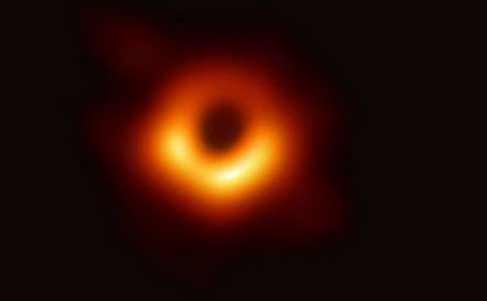 |
| Fig. Black Hole |
To be precise, the black hole itself won't give any particles, but the situation created by our Heisenberg's uncertainty principle is making the black hole emit radiation. Let's see how it happens...
First, we need to have a better understanding of vacuum to explain the Hawking Radiation. let's try to get a clear picture of it with the help of Heisenberg's principle...
The vacuum which is there in outer space is not exactly void of particles... If we say very confidently that nothing is there in a vacuum, that means, we're saying that the probability of finding any particles in a vacuum is zero, in turn, making the probabilities of having any velocity and acceleration for that particle also zero...
 |
| Heisenberg is here.. |
Here comes our uncertainty principle; It says we can never have such certainty with respect to the positions and velocities of particles at any given position in space at any given time..
So, our understanding of vacuum is not correct; Now, in order to accommodate the uncertainty principle, scientists proposed that the vacuum is not empty, and it has random fluctuations of energies in such a way that the net energy change is zero always (as you know, energy can neither be created nor destroyed). Scientists explained this phenomenon by taking the notation of "virtual particles". These particles are not real, just are there for our better understanding of things...
These particles are randomly created as a pair, where one particle has positive energy, and the other having negative energy. So the theory is like, these particles randomly pop up, and live out there for some random amount of time, and eventually annihilate each other.
So, overall there will be no energy change, and also, these particles ensure the randomness our uncertainty principle suggested...
Now, we can discuss the main point...
How these particles contribute to our Hawking radiation:-
Now, consider a black hole, and the vacuum just near its event horizon. Now also, these virtual particles pop up randomly (as it normally happens), but the annihilation is disturbed by a black hole...
As we discussed, there are two particles, which are of positive and negative energies. But, the negative energy particle will be present nearer to the black hole, because of two possible explanations:-
1. The particles with more energy will be farther to a body and those with less energy will tend to be nearer (to understand better, this is what happens with our atoms; electrons with higher energy will be situated farther from the nucleus..), so negative energy particle is nearer to the black hole (as it has less energy), and positive energy particle is farther from it (as it has more energy).
2. When the particles appear nearer to the black hole, the very much strong attraction of the black hole will make the particle nearer to it have the "negative energy" (as it is attracted towards the black hole, it means the work is done not to move away, but actually, to move towards it. So that particle is said to have negative energy. Even gravity is being seen as the force that deals with negative energies), so making the other particle have the positive energy.
So, this negative energy particle (which is, remember that, still virtual) is absorbed by the black hole. The positive energy particle will escape the black hole, as a real particle(as its virtual partner is no longer available). On the other side, absorbing negative energy is nothing but releasing positive energy; Hence the black hole releases particles with positive energies which are also real.
The emitted particles consist of:-
1. Those obtained due to absorption of negative energy virtual particles, and
2. The real-turned virtual positive energy particles.
These two kinds of particles that are emitted are nothing but the ingredients of our "Hawking radiation"...
thanks for reading :)
(Inspired from "A Brief History of Time", by Stephen Hawking)
Don't forget to give your valuable suggestions regarding the accuracy or explanation, and to share any similar works you know through comments, and helps us to get, 'The Eternal Thing'...
You can also get to know whenever a new post appears in this blog, by following the blog here
Meanwhile, you can view the animated explanation of the Hawking Radiation below...
P. S. What led Hawking to think about the idea of the black hole decay..?
Well, that's for another time, we'll meet again soon...
Comments
Post a Comment